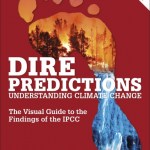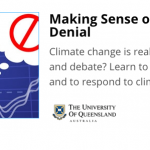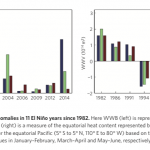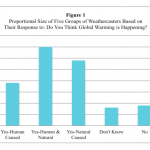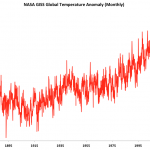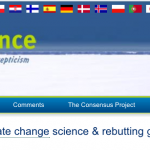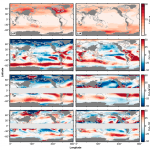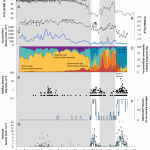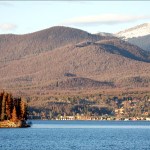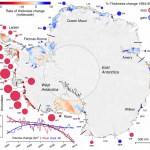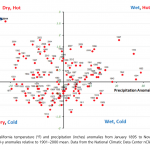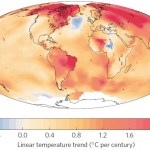Climate Change
Dire Predictions: Understanding Global Warming by Michael Mann and Lee Kump is everyperson’s guide to the latest Intergovernmental Panel on Climate Change (IPCC) report. The IPCC issues a periodic set of reports on the state of global climate change, and has been doing so for almost two decades. It is a massive undertaking and few have the time or training to read though and absorb it, yet it is very important that every citizen understands the reports’ implications. Why? Because human caused climate change has emerged as the number one existential issue of the day, and individuals,…
I recently posted an overview of a new climate study, Comparing the model-simulated global warming signal to observations using empirical estimates of unforced noise, by Patrick T. Brown, Wenhong Li, Eugene C. Cordero & Steven A. Mauget. That study is potentially important because of what it says about how to interpret the available data on global warming caused by human generated greenhouse gas pollution. Also, the since publication the study has been rather abused by climate contrarians who chose to interpret it very inaccurately. This is addressed in this item by Media Matters.
My…
A group of scientists attending a major conference get together in a bar. They talk, but they agree on nothing because they are critical academics. The server comes along to take the beer order and says, "I noticed you all are constantly arguing. What are you arguing about?"
"Sensitivity," one of them says. "It is the number of degrees C the Earth's surface will warm with a doubling of CO2 in the atmosphere. Is it 2, 3, 4? ... We cant settle on a number"
The server considers their plight for a moment. Suddenly, she rips several sheets out of her order book and hands one to each of the…
That is a good question, and difficult to answer. If it turns out to be, it will be the warmest calendar year in the instrumental record, which goes back into the 19th century.
Regardless of what El Nino (ENSO) does, 2015 will be a warm year. Why? Because everything is warm and getting warmer and even if 2015 is less warm than 2014, it will be warm. There is no other possibility.
Even without the effects of El Nino, though, it is possible that 2015 will be warmer than 2014 because we see a lot of heat out there. If the present, relatively weak El Nino continues for a while, it will likely…
This is Part I of a two part treatment of new research on climate change. Part II is here.
There is a new paper out, Comparing the model-simulated global warming signal to observations using empirical estimates of unforced noise, by Patrick T. Brown,Wenhong Li, Eugene C. Cordero & Steven A. Mauget. It is potentially important for two reasons. One is because of what it says about how to interpret the available data on global warming caused by human generated greenhouse gas pollution. The other is because of the way in which the results are being interpreted, willfully or through…
John Cook, of the University of Queensland, and his colleagues, have created a MOOC ... Massive Open Online Course ... called "Making Sense of Climate Science Denial."
Why does this matter? How does it work? What can you do?
All of these questions are answered here: University offering free online course to demolish climate denial.
Fight sticky myths with even sticker sticklier facts.
Do go check it out. See you in class!
___________________
Check out: The First Earth Day, an epoch journey into politics, explosions, folk music, and old boats floating on stinking rivers.…
The American Biology Teacher has hosted a guest editorial by Glenn Branch and Minda Berbeco of the NCSE. The editorial points out that climate science is under a similar sort of anti-science attack as evolution has been for years, though generally with different (less religious) motivations. Also noted is the problem of fitting climate change into the curriculum, especially in biology classes. Indeed, biology teachers are already having a hard time getting the standard fare on the plate. In recent years, for example, the AP biology curriculum has jettisoned almost everything about plants…
A new study seems to provide a better way to categorize El Nino climate events, and offers an explanation for how different kinds of El Nino events emerge.
El Nino is part of a large scale, very important climate phenomenon in the Pacific Ocean, generally referred to as the El Nino Southern Oscillation (ENSO). Over time (years) wind and water currents move heat into the upper levels of the Equatorial Pacific (La Nina). Then, over time (months) the heat comes back out – that is an El Nino. The effects can be dramatic. During El Nino years, trade winds and monsoons may behave differently than…
There was a time when I picked which local TV news station to watch based on the way the TV meteorologist addressed global warming. There were two stations in the running. One of them had a guy who frequently disparaged climate science, and the other had Paul Douglas, who no longer does TV meteorology (I no longer watch local TV news) but who has become a major spokesperson for reason and science (see: Paul Douglas on Climate Change and A Q&A with Paul Douglas, the evangelical Christian Republican poster boy for climate change). Paul and I have become colleagues and friends.
In 2011,…
The last 12 months have been the warmest one year period in the NASA database since records began in 1880. According to the just released NASA GISS Global Temperature Data, March, 2015 is estimated to have been the fifth warmest month on record. Here are the top 20 months in rank order:
2007JAN93
2002MAR88
2010MAR87
1998FEB86
2015MAR84
2010APR82
2014SEP81
2015FEB78
2014MAY78
2014OCT77
2005OCT76
2015JAN75
2013NOV75
2010NOV75
1998JUN75
1995FEB75
2010FEB74
2006DEC74
2014DEC73
2014AUG73
Here is the monthly data covering the entire period of the instrumental record (1880 - present)
And, most…
The site, not the thing. From the YouTube site:
Everyone at Skeptical Science spends a lot of their time reading the scientific literature and listening to experts. Without that we wouldn't be able to write all the material that's published on Skeptical Science. It's a lot of work, especially when you do this with a critical eye. Our goal, after all, is to ensure that what we write reflects the scientific literature on the subject as accurately as possible.
The materials created by Skeptical Science are used by teachers, politicians, and of course by users on the internet to rebut climate…
Maybe, maybe not. There is a new paper that looks at what climate scientists call “synoptic midlatitude temperature variability” and the rest of us call “cold snaps” and “heat waves.” The term “synoptic” simply means over a reasonably large area like you might expect a cold snap or heat wave to be. Specifically, the paper (Physics of Changes in Synoptic Midlatitude Temperature Variability, by Tapio Schneider, Tobias Bischoff and Hanna Plotka, published in Journal of Climate) concludes that as human-caused greenhouse gas pollution increases, the frequency of cold snaps in the northern…
A new study by Sarah Moffitt, Tessa Hill, Peter Roopnarine, and James Kennett (Response of seafloor ecosystems to abrubt global climate change) gets a handle on the effects of relatively rapid warming and associated Oxygen loss in the sea on invertebrate communities. The study looked at a recent warming event (the end of the last glacial) in order to understand the present warming event, which is the result of human-caused greenhouse gas pollution.
Here is what is unique about the study. A 30 foot deep core representing the time period from 3,400 to 16,100 year ago, was raised from a site in…
There is some interesting new work carried out by researchers at Dartmouth College and the USDA Forest Service on the relationship between the Mountain Pine Beetle, major die-offs of forests in North America, and climate change.
The Mountain Pine Beetle (Dendroctonus ponderosae) is a kind of “bark beetle” (they don’t bark, they live in bark) native to western North America. They inhabit a very wide range of habitats and are found from British Columbia all the way south to Mexico. In British Columbia alone, the pine beetle, though a fairly complex process, has managed to destroy 16 of 55…
Let me start off by saying something you may not know. The big corporations and the 1%ers you have learned to hate fund many of the projects you've learned to love. I have not checked lately, but Murdoch and FOX corporation for several years in a row funded at a 50% or 60% level virtually all of the National Geographic specials produced. Major museums known for their great exhibits are often funded by the very corporations or individuals that the people who love those exhibits are (often justifiably) suspicious of. The great importance of private corporate or individual funding is also a…
Antarctica is pretty much covered with glaciers. Glaciers are dynamic entities that, unless they are in full melt, tend to grow near their thickest parts (that's why those are the thickest parts) and mush outwards towards the edges, where the liminal areas either melt (usually seasonally) in situ or drop off into the sea.
Antarctic's glaciers are surrounded by a number of floating ice shelves. The ice shelves are really the distal reaches of the moving glaciers floating over the ocean. This is one of the places, probably the place at present, where melting accelerated by human caused…
There is a letter signed by top scientists demanding that science museums cut all their ties to Big Fossil, and where appropriate, kick the Koch Brothers off their boards.
The letter says, in part,
As members of the scientific community we devote our lives to understanding the world, and sharing this understanding with the public. We are deeply concerned by the links between museums of science and natural history with those who profit from fossil fuels or fund lobby groups that misrepresent climate science.
Museums are trusted sources of scientific information, some of our most important…
A paper just out now in PNAS by Noah Diffenbaugh, Daniel Swain, and Danielle Touma shows that "Anthropogenic warming has increased drought risk in California." From the abstract:
... We find that although there has not been a substantial change in the probability of either negative or moderately negative precipitation anomalies in recent decades, the occurrence of drought years has been greater in the past two decades than in the preceding century. In addition, the probability that precipitation deficits co-occur with warm conditions and the probability that precipitation deficits produce…
Climate scientists have noticed a disturbing pattern in the North Atlantic. This is the relative cooling of surface waters in the area fed by the Gulf Stream. This pattern has emerged over recent decades, and may portend very rapid and potentially disruptive climate change in the upcoming decades. The cooling is not subtle at all, and looks like this:
Map based on NASA GISS data of warming 1901-2013
So what does this mean? A paper out just today describes, explains, and discusses this odd anomaly and its potential consequences. First, a bit of context.
The Earth’s climate follows certain…
And by "Shut. Up." I mean shut up about whether or not global warming is real.
The National Climatic Data Center of NOAA has just released the number representing the Earth's surface temperature for February and it is a shocking 0.82 degrees C above the 20th century average. This is the second warmest Feb on record, and I'm pretty sure it is the third warmest month on record, in that data base.
Roughly speaking, the coldest we have experienced, the Last Glacial Maximum, was about 6 degrees colder than at present. It is generally thought that we need to keep the global surface temperature…
